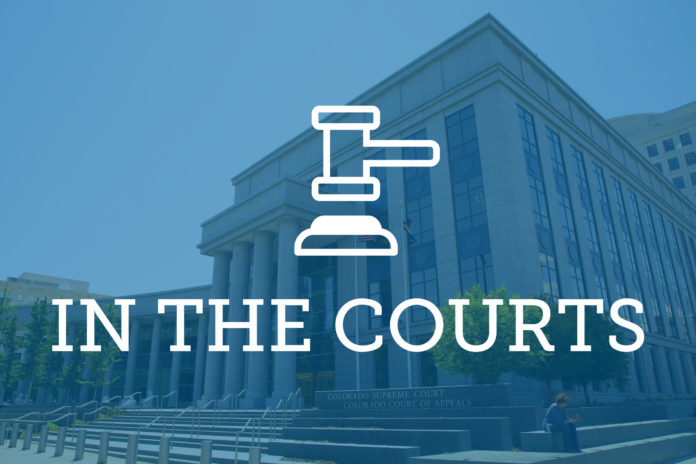
Editor’s Note: Law Week Colorado edits court opinion summaries for style and, when necessary, length.
Alexander Fregosi appealed the district court’s restitution order. The Colorado Court of Appeals affirmed the district court’s decision.
Fregosi pleaded guilty to menacing as an act of domestic violence in exchange for the dismissal of two other charges. As part of his plea agreement, he acknowledged “[t]he people reserved restitution” and he “stipulate[d] to [a] factual basis,” according to the opinion.
The district court accepted the plea agreement. The prosecutor asked for 91 days to seek restitution, which the court granted with no objection from Fregosi. 51 days later, on May 28, 2020, $873.10 was requested in restitution for the victim’s medical and therapy costs accrued to date. Additionally, the prosecutor told the court he believed further restitution would be forthcoming and asked the court to reserve future restitution under Section 18-1.3-603(1)(c) of the Colorado Revised Statutes.
The district court gave Fregosi 21 days to object, and he didn’t object or respond to the motion.
Later, the prosecution filed 13 amended restitution requests seeking compensation for the victim’s ongoing therapy costs. Fregosi objected, among other things, to the court entering any orders beyond the 91 day deadline without making express and timely good cause findings. The district court granted all the amended requests.
At a December 2021 restitution hearing, the Crime Victim Compensation Board reported the victim had reached the limit of therapy sessions covered by the CVCB. The district court then entered a final restitution order in the amount of $4,473.10.
Fergosi appealed, contending the district court lacked the authority to grant the prosecutor’s requested amount of restitution 73 days after sentencing for two reasons. The first contention argued the prosecutor failed to file the information necessary to support restitution before the judgment of conviction entered. The second contention argued the court failed to enter a specific order at sentencing under Section 18-1.3-603(1). The appeals court rejected both contentions.
On the first contention, the appeals court concluded Fregosi waived the issue, and even if he didn’t, the record showed the restitution information wasn’t available at the time of sentencing.
On the second contention, the appeals court found the district court made a good cause finding in an order entered before the 91-day deadline expired and the order was reiterated in each restitution order thereafter. The appeals court concluded the district court had the authority to extend the 91-day deadline based on future losses accounted for in the subsequent restitution orders.
The appeals court also rejected both of Fregosi’s arguments regarding disclosure of CVCB records and disagreed with his argument the district court erred in declining to conduct an in camera review of the CVCB records.
The appeals court affirmed the restitution order.
Demarea Mitchell appealed the district court’s judgment of first-degree felony murder, attempted aggravated robbery and conspiracy to commit aggravated robbery. The Colorado Court of Appeals affirmed the judgment.
Mitchell and three codefendants, all juveniles, conspired to rob the victim at gunpoint, according to the opinion. During the attempted robbery, the victim was shot and killed. Initially, all four of the codefendants were charged with felony murder based on their participation and were prosecuted as adults.
However, two of the codefendants, neither of whom are Black, agreed to cooperate with law enforcement, and their cases were refiled in juvenile court.
Mitchell, who is Black, argued his continued prosecution as an adult, while the two non-Black codefendants were prosecuted as juveniles, was selective prosecution based on his race, as the four codefendants all had the same charges filed against them initially.
The appeals court concluded sharing a charge doesn’t, by itself, make codefendants similarly situated for purposes of a selective prosecution claim. The appeals court found the state of Colorado may make different prosecutorial decisions with respect to codefendants who share a charge based on their different conduct.
The appeals court further concluded the district court didn’t err when it denied Mitchell’s motion for a reverse transfer to juvenile court or when it excluded certain evidence.
The appeals court affirmed the judgment.
Jeanmadi del Rosario Velez appealed the trial court judgment and jury verdict against her. The Colorado Court of Appeals affirmed and remanded with directions.
On Sep. 26, 2019, Velez failed to stop at a stop sign and collided with Cory Wolven’s vehicle. After the collision, Wolven was diagnosed with several long-term spinal and neck injuries she attributes to the crash. Wolven sued Velez for these injuries on April 8, 2021. The jury found in Wolven’s favor and awarded her a total of $1,953,443 for noneconomic and injury losses, economic losses and physical impairments.
Velez appealed the jury’s verdict and the trial court’s order entering judgment against her.
Velez argued the trial court erred when it admitted Wolven’s expert testimony cornering Wolven’s “whole person permanent impairment” rating, derived from the American Medical Association’s impairment guides. Velez contended the impairment ratings were only relevant in workers’ compensation context. The appeals court rejected the contention, citing the reasoning in Herrera v. Lerma, a 2018 appeals court decision, and found the AMA guides’ impairment rating relevant to the case.
The appeals court also disagreed with Velez’s argument the trial court erred when it declined to provide a limiting instruction on how impairment ratings work and Velez’s argument to the trial court when it excluded evidence of Wolven’s health care provider lien from trial.
The appeals court affirmed the jury verdict and judgment of the trial court and remanded the case with directions to correct the mistaken total of the jury verdict from $1,954,443 to $1,953,443.

